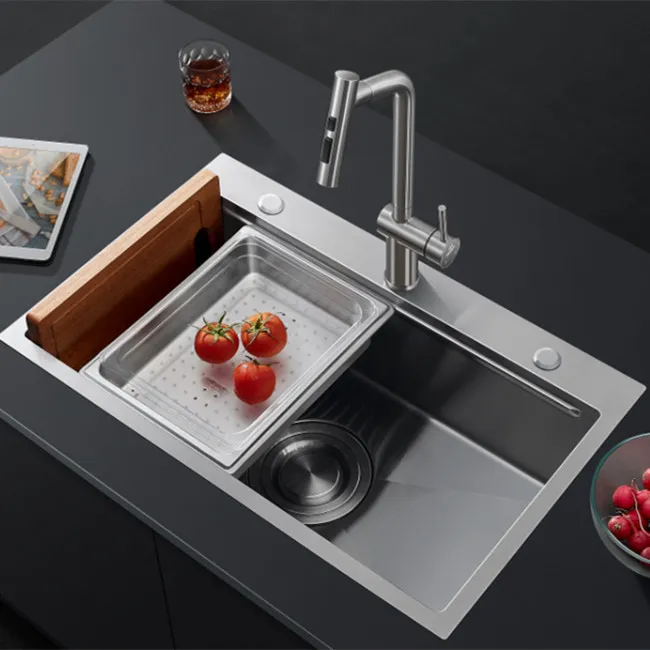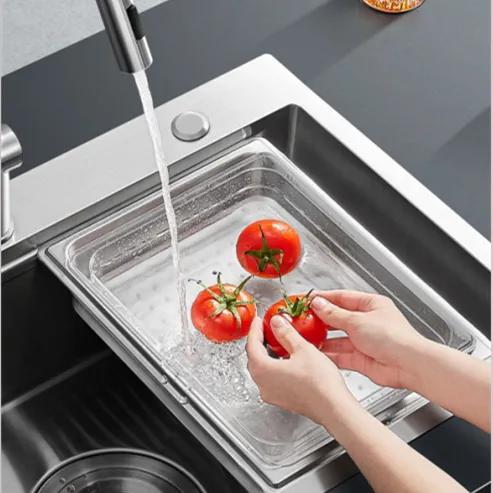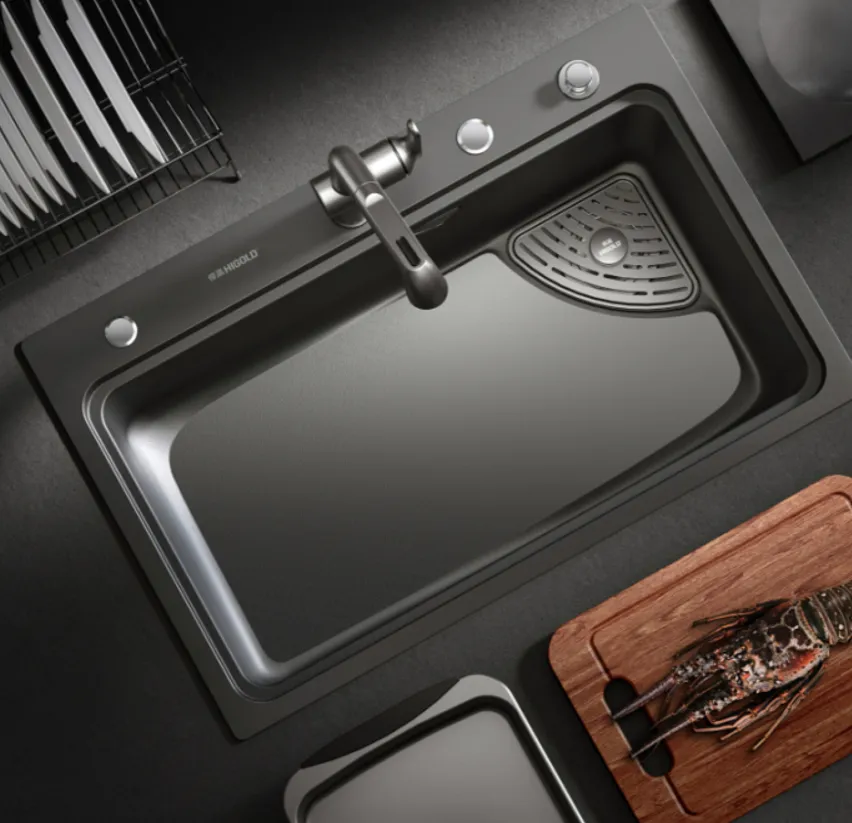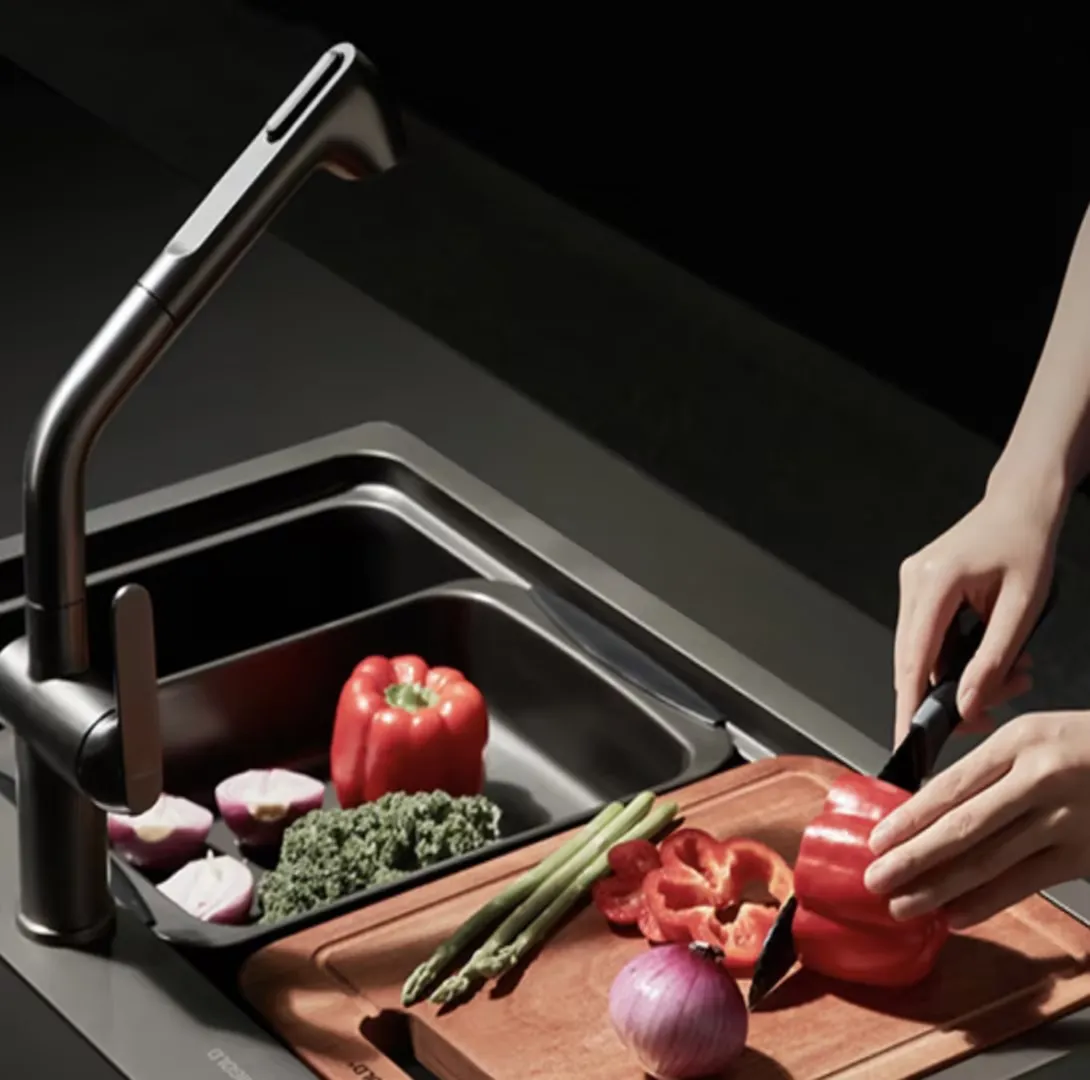In home renovation and kitchen design, the sink has always been an unassuming yet crucial component. It not only performs daily tasks like washing and preparing food, but also directly impacts the overall aesthetics and user experience of the kitchen.
In recent years, as consumers' demand for quality and personalization in their kitchens has grown, "black sinks" and "stainless steel sinks" have become two of the most discussed choices. Faced with these two mainstream materials and styles, many consumers ask a seemingly simple yet fraught question: "Should I buy a black or stainless steel sink?"
This article will systematically and professionally analyze the differences between black and stainless steel sinks from multiple perspectives, including material properties, durability, cleaning and maintenance, visual effects, kitchen style compatibility, cost-effectiveness, and user experience, to help consumers make a more logical choice.

Material: The Fundamental Differences Between Black and Stainless Steel Sinks
1. Basic Material of Stainless Steel Sinks
Stainless steel sinks are typically made of 304 or 316 stainless steel, which offer high corrosion resistance and mechanical strength. 304 stainless steel is widely used in kitchens and bathrooms for its antioxidant and acid- and alkali-resistant properties. 316 stainless steel, on the other hand, builds on 304 with enhanced resistance to salt spray and highly corrosive environments.
Stainless steel sinks are typically formed through drawing or welding processes, with thicknesses ranging from 0.8mm to 1.2mm. Thicker stainless steel sinks effectively reduce noise during cleaning and improve impact resistance.
2. Material Composition of Black Sinks
Black sinks are not made from a single material. They generally fall into two categories: granite composite sinks (typically a mixture of quartz and a polymer resin), and stainless steel sinks treated with a nano-coating or PVD process. The former have a naturally black texture, a delicate surface, and a feel similar to stone; the latter are traditional stainless steel sinks that have undergone a special surface treatment, resulting in a black or dark gray finish.
These two types of black sinks differ in terms of material stability and durability: composite materials are highly scratch-resistant but may develop fine cracks in extreme temperatures; coated stainless steel black sinks more closely resemble the performance of traditional stainless steel, but require attention to surface wear resistance. From a material perspective, stainless steel sinks tend to be more classic and mature, while black sinks offer a more versatile and decorative look.

Black sinks vs. stainless steel sinks: Which is more durable?
1. Durability of stainless steel sinks
Stainless steel sinks, due to their metallic properties, are extremely tough and impact-resistant. Even in the daily grind of the kitchen, stainless steel sinks can withstand heavy blows and prolonged use without damage. For households that frequently handle metal pots and large ingredients, stainless steel sinks are practically a "dauntless" choice.
2. Durability of black sinks
The quartz composite material used in black sinks has a higher surface hardness and is generally more scratch-resistant than stainless steel. However, due to its slightly greater brittleness, it may chip or crack if subjected to severe mechanical shock, such as a heavy drop. Coated black stainless steel sinks offer similar impact resistance to traditional stainless steel, but if the coating peels off, the base material exposed, affecting the overall aesthetics and corrosion resistance.
In summary, stainless steel sinks offer advantages in terms of impact resistance and long-term stability, while black sinks excel in surface scratch resistance.
Black sinks vs. stainless steel sinks: Which is easier to clean?
1. Cleaning Characteristics of Stainless Steel Sinks
Stainless steel sinks have a smooth surface and are relatively easy to clean. However, their disadvantage is that they easily retain water and oil stains. If left unwashed for a long time, they may develop scale marks. Furthermore, lower-quality stainless steel surfaces may develop scratches and even slight rust. To maintain their luster, they need to be wiped regularly and kept dry.
2. Cleaning Performance of Black Sinks
Due to their dark color, black sinks are less visually noticeable for water and oil stains, making them appear cleaner in everyday life. However, black sinks made of quartz composite material may still leave marks if exposed to dark liquids such as coffee and tea, requiring regular cleaning with a specialized cleaner. Coated black stainless steel sinks should avoid using strong alkalis, strong acids, or metal cleaning pads, as these can damage the surface.
In summary, stainless steel sinks are prone to showing marks but are more resistant to cleaning. Black sinks are more resistant to stains, but require careful cleaning.

Black vs. Stainless Steel Sinks: Visual Aesthetics and Kitchen Compatibility
1. Visual Characteristics of Stainless Steel Sinks
Stainless steel sinks have a glossy silvery color that blends well with a variety of kitchen designs, including modern minimalist, industrial, and traditional styles. Their neutral color palette prevents them from overpowering the kitchen and easily clashes with countertop colors, making them a versatile choice.
2. Aesthetic Effects of Black Sinks
Black sinks offer a more modern and personalized feel, particularly suited to minimalist, light luxury, and dark kitchens. Black sinks create a cohesive visual effect when paired with dark countertops, while contrasting with light-colored countertops creates a strong sense of depth and depth.
Stainless steel sinks emphasize classicism and practicality, while black sinks emphasize texture and design.
Black Sinks vs. Stainless Steel Sinks: Compatibility with Kitchen Environments
1. Compatibility of Stainless Steel Sinks
Stainless steel sinks are highly corrosion-resistant and resistant to humidity and fumes, making them ideal for kitchens with frequent use and high cleaning requirements. They are also highly resistant to various temperatures and food residue, making them widely applicable.
2. Compatibility of Black Sinks
Black sinks have advantages in terms of hardness and stain resistance. However, for families with frequent cooking and rough cooking, composite sinks may require more careful attention to avoid impacts. Coated black stainless steel sinks require more careful surface care. They are more suitable for families who value design and are more meticulous in their kitchens.
Black Sinks vs. Stainless Steel Sinks: Price and Value Comparison
1. Price Range of Stainless Steel Sinks
Stainless steel sinks, due to their mature production process and ample market supply, range in price from a few hundred yuan to over a thousand yuan. High-end products may feature improved thickness, noise reduction treatments, and drainage system designs. Overall, stainless steel sinks offer high cost-effectiveness and wide versatility.
2. Black Sink Price Range
Black sinks are generally more expensive than regular stainless steel sinks, especially those made of quartz composite, and tend to fall into the mid-to-high-end price range. The price of coated black stainless steel sinks varies significantly, influenced by the craftsmanship and brand. Overall, black sinks, due to their unique material and craftsmanship, often require an additional budget.
Therefore, stainless steel sinks offer a superior price-performance ratio, while black sinks carry a greater aesthetic premium.

Black vs. Stainless Steel Sinks: A Comprehensive User Experience Comparison
• Stainless Steel Sink Experience: Durable and adaptable to a variety of environments, classic and versatile, but can appear a bit "plain" and easily show water stains when cleaning.
• Black Sink Experience: Unique aesthetics, outstanding texture, and a more stain-resistant appearance, but require additional care regarding maintenance and impact protection.
For users seeking practicality and long-term durability, stainless steel sinks are clearly more suitable. For those seeking a beautiful design and a personalized kitchen style, black sinks are a more attractive option.
Black vs. Stainless Steel Sinks: How to Choose?
There's no definitive answer to the question, "Should I buy a black or stainless steel sink?" The key lies in the consumer's kitchen habits, budget, and overall kitchen style preferences.
If you prioritize durability, practicality, and value, and your kitchen sees frequent daily use, then a stainless steel sink is a solid choice.
If you seek visual quality, design aesthetics, and a personalized space, while also being willing to accept a certain level of maintenance, then a black sink will undoubtedly elevate your kitchen's overall style.
Ultimately, whether it's a black or stainless steel sink, the key decision isn't which is "better," but rather which best suits your kitchen and lifestyle.
How many patents does Higold own?
Higold has accumulated over 500 patents in kitchenware innovation, proving our strong R&D capabilities. This enables us to supply unique, high-quality sinks at competitive prices. Buyers can request customized ODM solutions, wholesale promotions, and affordable quotes from a Chinese factory recognized worldwide for innovation and quality.


